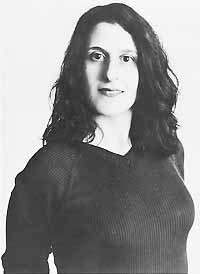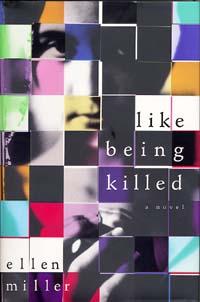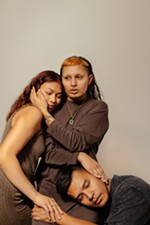Like Being Killed
By Marion Winik, Fri., Sept. 11, 1998
 I met Ellen Miller at a Barnes & Noble in Brooklyn this past April. She came to my reading there with the novelist Jonathan Baumbach, a kind and funny man under whom I studied when I was doing my MFA in the early Eighties. Ellen was a much more recent protegée. Jonathan thought I should meet her, and perhaps take a look at her forthcoming first novel as well.
I met Ellen Miller at a Barnes & Noble in Brooklyn this past April. She came to my reading there with the novelist Jonathan Baumbach, a kind and funny man under whom I studied when I was doing my MFA in the early Eighties. Ellen was a much more recent protegée. Jonathan thought I should meet her, and perhaps take a look at her forthcoming first novel as well.
Jonathan is the sort whose instincts in such matters are unimpeachable, so I asked Ellen to send me a copy of her galley, and I invited her to join us at a party after the reading at my friend Sandye's apartment. My impressions of Ellen that evening were vivid. She seemed a sort of East Village Emily Dickinson: pale skin, thick, dark hair, equally dark and prominent (she would probably say "exophthalmic") eyes. Cardigan sweater. Barely past 30, she had a sort of bubbly neurotic urgency that I found endearing. "I think we were just like that at 31," I said to Sandye after she'd left.
"You were, anyway," said Sandye. Ellen sent me her book with a note that touched and intrigued me. Referring to a conversation we'd had at the party, she wrote, "I thought for a long time about the notion of people having different tragedy quotients, and the difficulty of being a person with a high tragedy quotient, of finding people with similar types of experiences who happen not to be dead. I think, actually, that it's not hard at all to find people who have suffered from tragedy after unspeakable tragedy. ... What I think is extremely unusual, and precious, and rare, are the people who have suffered to a similar extent but who choose to remain sentient, and porous and engaged; who know exactly how extortionary is the cost of consciousness but choose (perhaps foolishly) to remain awake."
After I read her remarkably titled novel, Like Being Killed (Dutton, $24.95 hard), I realized that Ellen Miller is just the sort of person she described in that sentence, and that the "cost of consciousness" is the central theme of her writing and thought. Like Being Killed is the story of an extremely messed-up 25-year-old New Yorker named Ilyana Meyerovich. Like her creator, Ilyana is smart to the point of being unsettling, alarmingly well-versed in physics, pharmacology, literature, and linguistics. (After reading the book, then hearing Ellen read from a novel in progress which reveals her equally thorough grasp of oncology, genetics, and various other medical sub-specialties, I've suggested she get business cards giving her line of work as "Nauseating Polymath.")
Yet despite her intelligence and her Brown University degree, Ilyana is a heroin addict who chews her fingers until they are bloody, shits in her cat box when the toilet breaks, and, when she finally gets around to calling the plumber, has the most disturbing S&M affair with him I have ever heard or read about outside a snuff movie.
Most great books about drugs are not about drugs at all, and Like Being Killed falls into that category. It is at heart a book about friendship and morality, both their presence and absence. The first chapter quickly locates their absence: At a drug-soaked kitchen-table birthday party for their friend Gerry, Ilyana and her gang play a party game that consists of predicting how each of the guests will die — and at least one of their answers is put to the test much sooner than they expect. Introducing itself with black humor, engaging diction, and startling richness, the narrative voice that gets you through this ordeal is one you feel willing to rely on for the rest of the ride.
Representing the opposite side of things — real connection, real morality — is a former roommate named Susie, appearing first as a mournful memory, but soon to materialize in flashback full-fleshed, wholesome, and sweet as the peaches she puts in her pie in one of the book's most unforgettable scenes. When Susie moves in to Ilyana's crazed little world with her plants and exhaustive array of all-natural bath products, it becomes clear that she is as connected to the life force as Ilyana is to the death wish. Their not-quite-but-almost-romantic involvement is the central relationship of the book, the laboratory in which hypotheses about how people treat each other are tested and observed to their stark, poignant conclusions.
And amazingly, amid all this starkness and poignancy, a saving-grace levity raises its shyly grinning head. At the end of the book, where a series of heartbreaking scenes with a character dying of AIDS is punctuated by the observation that the band 10,000 Maniacs doesn't sound even like two maniacs, and that they should change their name to One Basically Normal Person Who Gets a Little Bit Silly After a Pint of Guinness, or perhaps Two Average Individuals Who Don't Act Entirely Sensible One Hundred Percent of the Time.
Like Being Killed has just been published in the United States after spending a month on the British bestseller lists — "tons of hype around this book and it surpassed it all," commented one U.K. reviewer. Stateside, Publishers Weekly proclaimed Ilyana "one of the more memorable misfits in modern fiction, TheVillage Voice called the book "hilariously horrifying," and a starred review in Booklist bowed to "Miller's prodigious talent." I phoned her to see how Emily Dickinson was doing under the klieg lights, and not so incidentally, to figure out where she was coming from in writing about such nasty, nasty things.
Austin Chronicle: So, Ellen. When a person produces a coming-of-age novel with a narrator in their early twenties whose name closely resembles that of the author, everybody's thinking, "autobiographical." To what extent is that true of Like Being Killed?
Ellen Miller: I moved to the East Village at the end of my teenage years and became a grownup here at a time when the area was an open-air heroin market and safe sex was not even a concept. It was before the current regime, before the Tompkins Square riots, before New York got sort of sanitized. Not only were there dealers and junkies everywhere, but also I saw people who were dying every time I left my house to buy milk. In 1987, my block was quite literally the epicenter of both the drug trade and the AIDS epidemic. And though I wasn't involved with any of it to even a fraction of the extent Ilyana is, if you take a person at the age I was — 20 years old — a creative person with some interest in states of consciousness, there's going to be some involvement of course. But nothing like the people in the book.
AC: And the name thing?
 EM: Here's what I think is a useful metaphor. When you look at box of breakfast cereal, it lists the ingredients and nutrients and vitamins, and the percent RDA for each one. You'll see there's a certain number that have an asterisk, meaning that the cereal contains less than 2% of this trace element. It doesn't get a number, but it's worth a mention. It's not worth quantifying, but it's there. Well, Ilyana is that asterisk dimension of me. If you were to break me down, you'd get 70% "nauseating polymath," 10% raging nerd, then less than 2% of a number of different things, one of which is Ilyana Meyerovich.
EM: Here's what I think is a useful metaphor. When you look at box of breakfast cereal, it lists the ingredients and nutrients and vitamins, and the percent RDA for each one. You'll see there's a certain number that have an asterisk, meaning that the cereal contains less than 2% of this trace element. It doesn't get a number, but it's worth a mention. It's not worth quantifying, but it's there. Well, Ilyana is that asterisk dimension of me. If you were to break me down, you'd get 70% "nauseating polymath," 10% raging nerd, then less than 2% of a number of different things, one of which is Ilyana Meyerovich.
My name, Ellen Miller, is about as generic as it gets. Her name is at the other end of the spectrum: Russian, old world, high romantic. It's as if you took some character out of Dostoevsky and dropped her down on the Lower East Side.
AC: So, Ilyana is a big giant junkie and Ellen is not. Well, maybe this is a reaction to my own experience, having written about hard drug use and having gotten slapped down for it, but I can't imagine choosing to write about heroin if you don't have to, if you aren't stuck with it on your plate autobiographically. Why did you do it?
EM: Because it's a conduit into human consciousness, like war or religion. If I'd lived through a war, if I'd been in Sarajevo, or in a deeply religious culture, I think I would have used those circumstances in the same way. I think that the extremes of existence are instructive, that they clarify the condition of what we call normal.
I'm not denying that I've had a certain involvement with drugs, but it's not key. What's key is that I really think about what I see, and there was a lot to see here. And — this is a way that I'm like Ilyana — I'm a pretty porous person. I see things and I absorb them. If I see a stray dog walking down the street, I become it for a while. I graft that consciousness onto my own.
AC: What exactly do you mean by the conduit to consciousness?
EM: An avenue into the human experience: what happens to people when their lives are overwhelmed by drugs, by war, by religious orthodoxy, by issues of class. In my next novel, as you heard at our reading, that overwhelming force will be science.
AC: What kind of reaction are you getting from the media? When they read about this outrageous abusive sex, do they assume it must be just another dysfunctional memoir, even if it says novel on the cover?
EM: Generally not. Anyone who knows me knows that the best time to reach me at home is Saturday night, and those who don't know me seem to figure it out pretty quickly. Anyway, I would hate to think that everyone who writes a first novel about murder would be taken to be a murderer. My situation is less that they assume it's a memoir than that I don't pass the authenticity check — and how do I have the right to write about this stuff if it never happened to me?
AC: The book contains some really disturbing sex. I can honestly say I have never read sex scenes as upsetting as these. I was reading some of it while lying in bed with my boyfriend, and I was tsking and gasping and saying "Oh my God, oh my God!" and when he asked what I was reading, I found I couldn't even tell him. I couldn't even say the words. It seems transgressive and really brave of you to even admit you've imagined such things, much less written them down and published them.
EM: Well thanks for saying "brave." Sometimes I feel like I should apologize to the reader for putting them through those scenes.
AC: Oh, no. You don't see Bret Easton Ellis apologizing to anyone for the hamster scene in American Psycho.
EM: Well, the reaction to this kind of writing is highly gendered. People are more willing to swallow this type of thing when men do it, and even think they're cool. They're adventurers. When you're a man, it's courage; when you're a woman, it's disgusting.
The fact is, I'm fascinated by a lot of extreme things, not just those in this book. If you were in my apartment, you'd see, I've got a whole big shelf the size of a wall of books about the Holocaust, other shelves about war, five books about Kaspar Hauser, the 19th-century Germany boy who was locked in the basement and never exposed to light, given food and water through a chute. When I read Primo Levi on the Holocaust, for example, or Tim O'Brien on Vietnam, or books about Kaspar Hauser, it transports me to the extreme, makes me question our apparent distance from it, and lets me think about how I or anybody else might act in such situations.
AC: And so stuff like Ilyana picking at her fingers — I have to admit, the first time I saw you after reading the book I looked at your hands and was suprised they were so normal — and the awful cucumber scene with the plumber, these just pop out of your imagination?
EM: The choice that I make is to spend a couple of years asking myself what would it be like to be these characters. Once you make a decision to become this person, you have to have the courage to follow through. I don't just walk around thinking about cucumbers; it came specifically out of imagining Ilyana. And one thing I have to say is that I think that for Ilyana, as convoluted as it is, as misdirected and re-routed as it is, being with the plumber is her own very distorted quest for joy.
AC: Good God almighty.
EM: Or power, or a sense of existing in relationship, not in a completely isolated monad of the self. One thing we can't deny about her and the plumber is that they know what each other wants. Not that many people in her life have been willing to pay that kind of attention to her. It's a way of getting out of her metaphysical frying pan into his very concrete fire. Maybe it's easier to have a cucumber up your ass than to have a hopelessness that won't go away.
One of the things that was very important to me in writing the book is that I couldn't accept that the people I saw on the street every day passed out with rats gnawing on their toes, that those people who were not gonna be there in two weeks because they were dead, didn't have some underlying purpose. They certainly weren't having fun. And I couldn't accept that people would embrace certain misery and almost certain death unless there was a pay-off.
I believe, and I hope the reader believes, that for Ilyana, everything she does, including the most terrible things, have some kind of wish for redemption behind them. No matter how much she seeks self-destruction, she is damned to life, and stuck with her self: themes, by the way, which I very much saw in your book, First Comes Love.
AC: Did you know, I really wanted to call my book, Do Not Try This at Home: The Story of My Marriage. I love your title: Like Being Killed. And I love the way its meaning is revealed in the book. It reminds me of Annie Lamott's novel, All New People. When you find out what that title means, it kind of changes the whole book. It gives you goosebumps, even makes you cry.
EM: When people first hear it, they grimace or they love it or they're totally mystified. But I really don't like to talk about it too much because I think it's better if they uncover the meaning for themselves, in the book.
AC: I think a rule of thumb might be that your most qualified readers are the ones who realize from the minute they hear it that it's a positive thing, a metaphor for something good, not bad.
EM: You might be right.
AC: Personally, I've been thinking that Minute Maid Orange Juice should change the slogan on their label from "Tastes Like Fresh Oranges" to "Tastes Like Being Killed."
EM: I would like that very much.
AC: And of course we're all waiting for your sequel, Like Being Resuscitated Only to be Killed Again.
EM: (laughs) That's great.
AC: Well, I can't take credit for it, my friend Crispin thought it up. You can't be too careful about attributions in this day and age.








